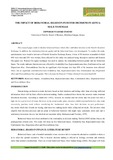| dc.contributor.author | Onsomu, Zipporah N | |
| dc.date.accessioned | 2014-07-15T06:46:24Z | |
| dc.date.available | 2014-07-15T06:46:24Z | |
| dc.date.issued | 2014 | |
| dc.identifier.citation | Onsomu ZN. "The impact of Behavioural biases on investor decisions in Kenya: Male vs Female (2014). International Journal of Research in
Humanities, Arts and Literature (IMPACT: IJRHAL), 2(6):pages 87-92. | en_US |
| dc.identifier.uri | http://oaji.net/articles/488-1404475281.pdf | |
| dc.identifier.uri | http://hdl.handle.net/11295/72986 | |
| dc.description.abstract | This research paper seeks to identify behavioral biases which affect individual investors at the Nairobi Securities Exchange. In addition, the relationship between gender and the behavioral biases was investigated. To conduct the study, questionnaires were issued to investors of Nairobi Securities Exchange, Kenya. A total of 58 investors responded of which 69% were men and 31% were women. Data collected for this study was analyzed using descriptive statistics and Pearson Chi-square test. Pearson Chi-square technique was used to analyze the relationship between gender and the behavioral biases. The results indicated that investors are affected by Availability bias, Representativeness bias, Confirmation bias and Disposition effect. Overconfidence bias has no significant effect because less than 50% of the investors were affected. There was no significant correlation between Availability bias, Representativeness bias, Confirmation bias, Disposition effect and Overconfidence bias and gender. This is because the Pearson P-Values obtained were more than 0.05. | en_US |
| dc.language.iso | en | en_US |
| dc.title | The impact of Behavioural biases on investor decisions in Kenya: Male vs Female | en_US |
| dc.type | Article | en_US |
| dc.type.material | en_US | en_US |

